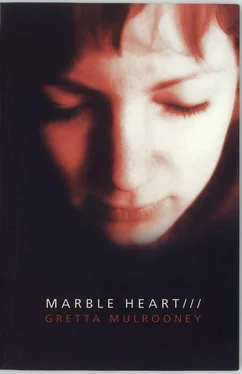1 ...6 7 8 10 11 12 ...16 ‘I could never make the night my friend. It pressed down on me, a heavy, alien blanket. I had intimate knowledge of all the phases of wakefulness. I could have written a thesis on them. First the sudden, dry-throated exit from sleep, eyes heavy but watchful, then the awareness of a rapid heartbeat, the twitch of tired limbs, the efforts to find a magic position that would lure slumbers back; left side, stomach, back, right side, foetal curl, left side again. As the minutes slid into hours there would be unsuccessful attempts to clear the mind, the random racing and crashing together of thoughts. Often in the thick darkness I would see you, your hair misty with smoke from the turf fire, jazzing on Finn’s grand piano or playing duets with him. Snatches of the songs you used to sing echoed in my head, particularly that rousing chorus from Brecht:
“So left, two three,
So left, two three,
To the task that we must do;
March on in the Workers’ United Front
For you are a worker too.”
‘I could hear the thump of your ankle boot as you kept time on the ancient carpet, dislodging years of dust: left, two three, left, two three. The march would go on and on, resounding along the years.
‘Sometimes I would be awake for three hours, sometimes four; on a very bad night, five. I learned the different qualities of darkness, from the impenetrable blackness of two AM through the thinning greyness that preceded dawn and finally the pale, lemony light that illuminated the striped curtains. In the summer months I regularly heard the day stealing in. A feeling of panic would take over as the first birds whistled or a milk float whined along the street; another episode of my life was about to begin and I had had no respite from the previous one. All order, all balance had vanished. Then I might cry from sheer frustration, tears of tension and self-pity, but very quiet tears so that Martin wouldn’t wake. My poor Martin. God knows what he made of it all, watching me mutate into a semi-zombie. He must have thought the woman he’d married was cursed with a schizoid personality.
‘On campus each day I would lock my office door at lunchtime and doze in my chair, the kind of sleep where you are half alert to voices and noises, where you twitch and jitter. My watch alarm would warn me when my time was up and I would come to, dazed and hot, eyes pricking. I took to not eating in the middle of the day because food made me more sluggish. My afternoons were spent sleep walking. I delivered lectures through an obscuring haze. It was as if I was inside a tank and my students were sitting on the other side of the scummy glass. I have no idea how I managed to keep going for so long. The students were kind and long-suffering. It is just as well that I had to resign when I did. No doubt in these days of mission statements and quality monitoring one of them would eventually have complained about me and I would have been inspected and found wanting, perhaps dismissed.
‘I have separated from Martin. I left him some months ago. I was mistaken if I hoped that giving him up would mean that I could sleep again. Deep down I believed that if I denied myself my husband, made a conscious sacrifice, some pity might be afforded me. My gesture of self-denial might be taken into account, weighed on unseen scales and go some way towards restoring the order I had helped to disrupt. But of course there is no unseen dispenser or order and justice – the responsibility for that lies within ourselves. And so I continue to wake at two. I suppose that the habit of fifteen years is hard to break. Returning to a single, friendless bed made no difference. It simply meant that I had no one to watch but myself, no breathing to listen to but my own.
‘I lied to the woman you will hear more about, Joan Douglas. She asked if I had tried sleeping tablets and I said I had. I knew that if I told the truth she would have encouraged me to get some; I would have had to listen to advice about breaking the pattern of insomnia. I’m sure that at some point she would have said, “You won’t know yourself once you’ve had a couple of unbroken nights”. Joan is one of those people who needs to think that every problem has a solution. I won’t allow myself sleeping tablets because I don’t deserve them. I deserve to lie awake and contemplate shadowy demons.
‘As the clock ticked this morning I imagined Joan lying asleep in her bed, snugly lulled by her own medication. She confessed that she is sometimes wakeful. Any wakefulness you experience will have skulking in its depths our shared memory, that icy hammer that shatters the warm layers of unconsciousness. I have no idea how the passage of time might have assisted you in reshaping that memory. I know that when I turn on my computer I will find exactly what I committed to it previously but the mind shifts and transforms, illuminating the past with the light of present experience. I only know that I can describe what happened in a certain place at a certain time.
‘We last saw each other in 1972. The annual letters we have exchanged since then have been paltry things, lists of domestic trivia. We have been unable to let each other go but we never allude to what we did. Our short notes have summarised the passing years; my teaching and marriage, my ill health, your involvement in crop planning and health promotion. Neither of us ever mentioned Finn until 1994 when you wrote that you’d heard from a cousin that he had been shot with two other men by a Protestant paramilitary. It was a pub shooting and that phenomenon all too familiar in Northern Ireland, a case of mistaken identity, the drinkers taken for IRA activists. That was all; one stark sentence sandwiched between paragraphs about the orphanage you were working in. “Peter said he was sure he heard the name Butler on the radio report.” When I read it I felt a gentle lift of the heart; he had, after all, been the instigator of what we did. He had presented us with the idea, urged us on, set up the plan. Then, as I re-read the news I thought, that deals with him, that settles part of the account. Now, what about us? His going was like a crack of light entering a dark room; the knowledge that he was dead allowed me seriously to consider what I should do to resolve my own unchallenged guilt. And so I pondered and recognised that no amount of charitable work or self punishment would do. I came to the decision that has prompted this letter and will unravel the past.
‘Joan, my new paid helper, will maintain me while I marshal my energy to write. She will be here again in the morning with her exhaustingly breezy manner and skirt that is just a little too short, making her plump knees look oddly naked. She will say how nice the bookshelves are looking now or aren’t the roses in the conservatory coming on a treat or I’ll feel better once I’ve got a nice breakfast down me. I will smile at her and when she’s bustled to the kitchen I will sink my head onto my chest and breathe deeply.
‘When she arrived the first time, wearing an awful apron, I was amazed at what I had let myself in for. I hid my feelings behind a businesslike mask. Cowardly, I almost told her that I had changed my mind or that we wouldn’t suit each other. I nearly cried out when she said that she’d have to be careful with her grammar now that she knew that I had been a teacher. Joan is the kind of person I would normally avoid, one of life’s surface optimists and lover of shallow wisdoms. When she touches her cheek and says that she speaks as she finds or you have to put your best foot forward, I want to run and hide.
‘But I won’t run, because I need Joan, I am no longer able to function alone. The days are too onerous without someone to do all those time-consuming tasks that can easily take hours when one moves at a snail’s speed. I am willing to endure recitals of the dreadful poet she likes, one Grace Ashley. Joan informed me that she has six teddy bears on her bed and in the early hours of today I pictured them watching her, open-eyed, just as I used to watch Martin. Then I reached into the drawer under my bed and took out this lap-top computer, a leaving present from my fellow lecturers. It wasn’t a surprise gift, I had told the head of languages what I wanted. As the parcel was handed to me I surveyed the uneasy figures in the room, standing awkwardly with their paper cups of cheap wine. I thought how horror-struck they would be if they had an inkling of the story that was going to be typed on their token of farewell, how their embarrassed sympathy would turn to outrage. An echo of the kinds of comments often uttered to reporters when a neighbour has been discovered in a crime came to me: “She always seemed a nice, quiet sort of person, kept herself to herself. Nobody round here would have thought she’d been involved in anything like that.”
Читать дальше












